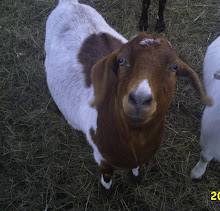Goat 'condoms' save Kenyan herds
By Ruth Nesoba
BBC News, Nairobi
*Maasai herdsmen in Kenya have turned to an age-old
contraceptive device, the "olor", to protect their
precious goat herds from an ongoing drought. *
The olor is made from cowhide or a square piece of
plastic, and is tied around the belly of the male goat.
It prevents the bucks from mating with the female goats.
The herdsmen are using the device to limit the goat
population and ensure there are not too many animals
grazing on sparse vegetation.
"We don't want them to breed in this drought," says Mr Ole
Ngoshoi Kipameto, a goat owner in Kajiado district.
* Vital assets *
The area, which is 80km (50 miles) from the capital,
Nairobi, has received insufficient rainfall, making the
landscape barren and forcing residents to move from place
to place in search of pasture and water.
In the Maasai community, livestock are often people's only
assets and sole means of survival.
"We tie this hide under the belly of the buck for three
months. After that we remove it and then they can breed by
November when the short rains come," Mr Kipameto says.
The rectangular piece of cowhide is passed over the buck's
head and front legs and secured under the belly in front
of the hind legs with a rope or elastic strap.
"It looks like an apron," Mr Kipameto says.
Peter Ndirangu, the area livestock officer, says the olor
is very effective.
"In the modern method, we advocate keeping the bucks
separate from the breeding goats. But that is an added
cost as you require two herdsmen - one for the bucks and
one for the goats," he says.
"This [device] will play the part of a herdsman."
He says the device is very useful in keeping the herd
numbers down and controlling when the goats give birth.
"If they give birth during harsh conditions like now, the
mothers - the does - are going to be very weak, they're
not going to feed their young ones properly," he says.
The device helps the herdsmen to restrict kidding to the
period during and after the rains.
If the rains fall in October and November, the dry
landscape will turn green again and the herdsmen will be
able to settle with their livestock.
Until then, the herdsmen will have to employ the olor to
protect their livestock and livelihood safe.
Those who do not use it could face a hefty fine if their
bucks are found guilty of impregnating another herder's
doe.
Story from BBC NEWS:
http://news.bbc.co.uk/go/pr/fr/-/2/hi/africa/7648860.stm
Published: 2008/10/06 00:44:51 GMT









1 comment:
Oh goodness!
Post a Comment